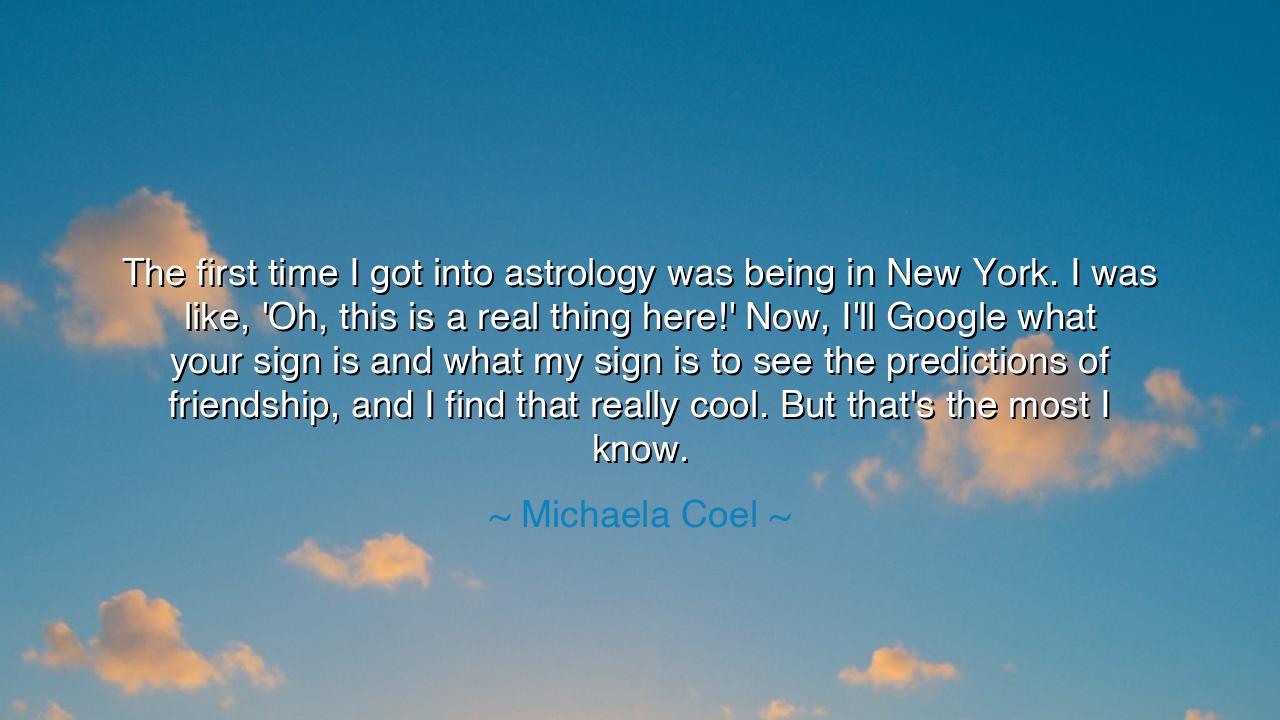
The first time I got into astrology was being in New York. I was
The first time I got into astrology was being in New York. I was like, 'Oh, this is a real thing here!' Now, I'll Google what your sign is and what my sign is to see the predictions of friendship, and I find that really cool. But that's the most I know.






“The first time I got into astrology was being in New York. I was like, ‘Oh, this is a real thing here!’ Now, I’ll Google what your sign is and what my sign is to see the predictions of friendship, and I find that really cool. But that’s the most I know.” Thus spoke Michaela Coel, the visionary storyteller, whose words shimmer with curiosity and humility. Beneath their lighthearted tone lies a profound reflection on the eternal human desire to understand connection—to seek meaning in the unseen forces that bind us together. In her statement, Coel reveals something both modern and ancient: the yearning to grasp the mystery of friendship, not only through reason but through wonder, through the stars themselves.
The origin of her words lies in an age-old fascination that has followed humankind since the dawn of civilization—the study of the heavens, or what we call astrology. In ancient Babylon, Egypt, and Greece, wise men and women looked skyward, believing that the patterns of the stars reflected the patterns of life. They saw in the movement of planets the pulse of fate, the rhythm of the heart, the harmony between souls. To the ancients, the universe was not indifferent; it was alive, whispering guidance to those who would listen. When Coel speaks of “Googling signs” to see the predictions of friendship, she is, in her own way, participating in that same timeless act of wonder—seeking in the cosmos an answer to the most intimate of human questions: Who belongs to me? Who understands my soul?
Yet, Coel’s tone carries both reverence and restraint. She calls astrology “a real thing,” yet admits, “that’s the most I know.” This humility is wisdom. It reminds us that while the stars may inspire, they cannot define. Friendship, after all, is not written merely in the heavens but forged in the heart. The ancients themselves—those who charted the constellations—knew that fate and free will are twin forces, entwined but distinct. The stars may guide, but they do not command. To know another person is not simply to know their sign, but to listen, to share, to trust, to forgive. The horoscope may spark curiosity, but it is love, patience, and empathy that make friendship endure.
History is full of examples where friendship transcended every supposed boundary—of birth, belief, or even destiny. Consider the bond between Aristotle and Alexander the Great. One was the philosopher, devoted to contemplation; the other, the conqueror, driven by ambition. By any measure—astrological or otherwise—their natures could not have been more different. Yet through their differences, they found mutual respect and understanding. Aristotle’s wisdom tempered Alexander’s fire; Alexander’s courage gave life to Aristotle’s teachings. Their friendship was not fated by the stars—it was forged by choice, by shared purpose and affection. It teaches us that no chart can predict the miracles that arise when two souls decide to see and value one another.
Still, there is beauty in what Coel expresses. Her fascination with astrology is not superstition, but wonder—a sense of awe at the possibility that the universe itself may reflect our inner lives. There is something deeply human in this: we seek patterns because we long for meaning. We look to the stars because they remind us that we are part of something vast, something eternal. And in moments of connection—when we laugh with a friend, when we sense a mysterious bond—we feel that perhaps, indeed, something greater than chance has drawn us together. Coel’s words awaken in us that childlike curiosity: what if the cosmos rejoices when two people meet and become friends?
Yet the true power of her statement lies in its balance between belief and reason, between the mystical and the real. She finds astrology “cool,” but she values friendship more than prediction. The ancients, too, taught this balance. They read the stars not to control others, but to understand themselves. The wise person, they said, does not blame the heavens for his failures or rely upon them for his joys—he uses them as mirrors to reflect upon his own spirit. So too should we use tools like astrology—not as chains that bind our relationships, but as lenses that help us see with greater empathy, to imagine how another’s soul might differ from our own, and to meet them with compassion.
Let this be the lesson we carry from Coel’s reflection: it is noble to wonder, but nobler still to act. It is good to seek the stars, but better to nurture the hearts beside us. Read the constellations if they inspire you, but do not forget to look into the eyes of your friend, for there lies a universe more complex and beautiful than any chart. Speak not only of signs and symbols, but of dreams, fears, and laughter. In doing so, you will find a friendship written not in the cold light of distant planets, but in the warm fire of the human spirit.
For the stars may guide us, but it is love, chosen and renewed each day, that gives meaning to their light. Michaela Coel’s words remind us that wonder and wisdom can walk hand in hand—that while we gaze at the heavens for clues, it is here on Earth, in the embrace of friendship, that the divine truly reveals itself.






AAdministratorAdministrator
Welcome, honored guests. Please leave a comment, we will respond soon